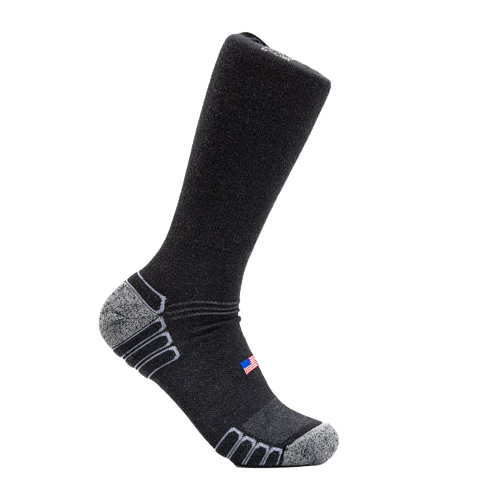In the red corner, we’ve got merino wool socks.
And in the blue corner, cotton socks.
Both have their perks, but which one will keep your feet happiest on the job?
Properties and Benefits of Merino Wool
Thermal Regulation
Merino wool is great at keeping your feet warm when it's cold and cool when it's hot. This is because of its unique fiber structure. The fibers trap air, creating small pockets of insulation.

In cold weather, these pockets hold warm air close to your skin. When it's hot, the fibers wick moisture away, helping cool you down.
Merino wool can absorb up to 30% of its weight in moisture without feeling wet. This helps keep your feet at a steady temperature all day long.
Moisture Management

Simply put, merino wool is awesome at handling sweat. It pulls moisture away from your skin, keeping your feet dry and comfy.
The fibers can absorb a lot of water before they start to feel damp. This means your feet stay dry even when you're on your feet all day on a 14-hour shift.
Merino wool also dries quickly. When moisture evaporates from the fibers, it takes heat with it. This helps cool your feet down when you're working hard or it's hot out.
Unlike cotton, merino wool doesn't hold onto moisture. This helps prevent blisters and keeps your feet feeling fresh.
Odor Resistance
Smelly feet? Not with merino wool socks. These socks naturally fight odors, keeping your feet fresh all day.

Merino wool has natural antimicrobial properties. This means it stops the growth of bacteria that cause bad smells.
The fibers also absorb odors, trapping them inside. When you take off your socks, the smells release into the air.
We love that merino wool socks can be worn multiple times before washing. This is great for travel or when you're short on laundry time.
Durability and Maintenance
Merino wool socks last a long time with proper care. They're naturally elastic, so they keep their shape well.
They resist wear and tear better than cotton. The fibers are strong and flexible, bouncing back into shape after being stretched.
Caring for merino wool socks is easy. They don't need to be washed after every wear unless they're really dirty.
.jpg?v=1689226369)
When you do wash them, use cold water and gentle detergent. Avoid fabric softeners, as these can damage the natural properties of the wool.
Merino wool socks dry quickly, but it's best to air dry them. This helps them keep their shape and softness for longer.
Comparing With Cotton
Comfort and Softness
Cotton feels nice and soft against the skin. It's a natural fiber that many find comfy to wear. Cotton socks are lightweight and don't feel heavy on your feet.
They work well for everyday use in mild weather. Cotton adapts to your foot shape over time, molding to fit you better.
But cotton can lose its softness after many washes. It may pill or get thin spots more quickly than other materials.
Breathability and Absorption
Cotton is known for being breathable. It lets air flow to your feet, which can help them stay cool. This makes cotton good for sweaty feet.
It also soaks up moisture well. Cotton can hold a lot of sweat or water.
The downside? Once wet, cotton stays damp. It doesn't dry fast. This can lead to blisters on long walks or runs.
In cold weather, wet cotton socks can make your feet freeze. They don't insulate when damp.
Hypoallergenic Qualities
Many people with sensitive skin do well with cotton. It's a natural fiber that rarely causes allergic reactions.
Cotton is often the go-to for those with skin issues. It's gentle and doesn't irritate most people's feet.
But cotton can harbor bacteria if it stays damp. This might cause odor or skin problems for some folks.
Price Considerations
Cotton socks are usually cheaper than other types.
They're easy to find in most stores. This makes replacing them simple and affordable.
But cheaper cotton socks may wear out faster. You might end up buying new ones more often.
Higher quality cotton socks cost more. They last longer but still not as long as some other materials.
Which Is Right for You?

Merino wool socks (like these from us here at Camel City Mill) are the unsung heroes of the work world. They’re warmer, wick away moisture like a pro, and fight off odors, making them ideal for long, sweaty days on your feet.
If you're working construction, in a warehouse, or any job where your feet are put to the test, merino wool is a bit like that coworker that has your back all day.
Even if you get caught in the rain or snow, these socks keep you warm and comfortable, a huge win for anyone who works outdoors.
On the flip side, cotton socks bring the comfort game strong. They’re soft, breathable, and perfect for more laid-back, indoor work environments. Plus, they’re usually less expensive than their merino counterparts, so you can stock up without breaking the bank. However, cotton tends to hold onto moisture, which can lead to blisters and discomfort if your job gets physically demanding or if you’re working in hot conditions.
One thing's for sure though, picking the right socks can make all the difference in your workday.






